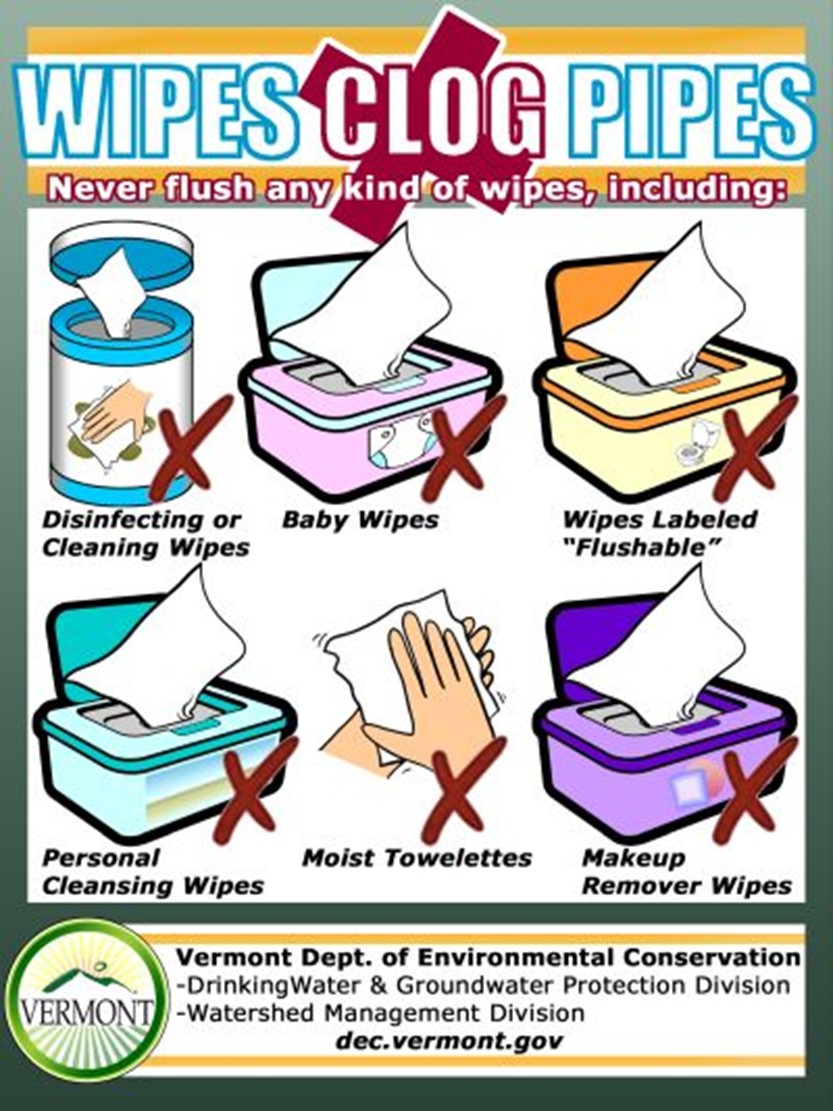PRESS RELEASE
For Immediate Release – March 16, 2023
Contact:
Amy Polaczyk, Wastewater Program Manager
Department of Environmental Conservation
802-490-6185, Amy.Polaczyk@vermont.gov
What Not to Flush: Prevent Issues and Save Time and Money with These Tips
Montpelier, VT – The Department of Environmental Conservation (DEC) is offering a few tips on what not to flush and how to better dispose of that waste.
“From on-site septic tanks to municipal wastewater systems, Vermont generates a lot of wastewater,” said DEC Commissioner John Beling. “Municipal wastewater treatment facilities process 15 billion gallons of wastewater each year. With such a staggering amount of wastewater, it’s critical for Vermonters to think about what we’re putting down our toilets and drains.”
Most things – including tissues, cotton swabs, floss, diapers, feminine hygiene products, coffee grounds, cat litter, wipes, excess household cleaners, cigarette butts, and drugs – should not be flushed.
Even products advertised as ‘flushable’ can clog drains, accumulate in pumps in the sewer system, or interfere with treatment at wastewater facilities, all of which cost the homeowner or the public extra money. For health and sanitation reasons, Vermonters should only flush bodily fluids, soap, and toilet paper.
“Everything we flush – except water – is waste or pollution,” said Wastewater Management Program Manager Amy Polaczyk. “Knowing where and how to best dispose of waste can cut wastewater treatment costs, protect our health, and keep our environment clean.”
To prevent issues and save time and money, use these tips to dispose of things the right way:
- Fats, oils, and grease: Bring to a transfer station or food scrap drop-off’s food waste bins, or work with a food scrap hauler that accepts fats, oils, and grease.
- Food waste and organics like coffee grounds: Compost at a drop-off, at home, or work with a food scrap hauler. Remember to also follow bear-friendly composting practices.
- Hazardous waste labeled toxic, hazardous, poisonous, reactive, corrosive, or flammable: Bring to a household hazardous waste collection event or facility.
- Solid waste like “flushable” wipes, pet waste, and cigarette butts: Put in the trash.
- Needles and sharps: Learn how to safely dispose of sharps.
- Drugs like medicine, vitamins, and pills: Visit the Department of Health’s prescription drug disposal system.
To learn more, visit the DEC Wastewater Management Program. If Amy Polaczyk is not available, contact Michelle Kolb at 802-490-6165 or Michelle.Kolb@vermont.gov.
###
The Department of Environmental Conservation is responsible for protecting Vermont's natural resources and safeguarding human health for the benefit of this and future generations. Visit dec.vermont.gov and follow the Department of Environmental Conservation on Facebook and Instagram.

“Flushable” wipes clog pipes and should be disposed of in the trash not the toilet.
